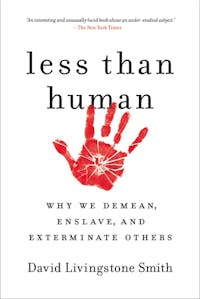Less Than Human
Why We Demean, Enslave, and Exterminate Others
 Download image
Download image
ISBN10: 1250003830
ISBN13: 9781250003836
Trade Paperback
336 Pages
$18.99
CA$24.99
Winner of the Anisfield-Wolf Book Award for Nonfiction
"Brute." "Cockroach." "Lice." "Vermin." People often regard members of their own kind as less than human, and use terms like these for those whom they wish to harm, enslave, or exterminate. Dehumanization has made atrocities like the Holocaust, the genocide in Rwanda, and the slave trade possible. But it isn't just a relic of the past. We still find it in war, genocide, xenophobia, and racism. Smith shows that it is a dangerous mistake to think of dehumanization as the exclusive preserve of Nazis, communists, terrorists, Jews, Palestinians, or any other monster of the moment. We are all potential dehumanizers, just as we are all potential objects of dehumanization. The problem of dehumanization is everyone's problem.
Less Than Human is the first book to illuminate precisely how and why we sometimes think of others as subhuman creatures. It draws on a rich mix of history, evolutionary psychology, biology, anthropology, and philosophy to document the pervasiveness of dehumanization, describe its forms, and explain why we so often resort to it. Less Than Human is a powerful and highly original study of the roots of human violence and bigotry, and it as timely as it is relevant.
Reviews
Praise for Less Than Human
"David Livingstone Smith knows evolutionary biology, and history,and psychology, and philosophy, and anthropology, and has put them together to produce a riveting, unflinching and disturbingly accurate account of human warfare, from the 'commanded wars' of the Old Testament to Bush's Blunder in Iraq."—David P. Barash, professor of psychology, University of Washington and author of Madame Bovary's Ovaries, Understanding Violence, Approaches to Peace, and The Caveman and the Bomb
"An interesting and unusually lucid book about an under-studied subject."—The New York Times
"Smith offers an impressively thorough survey of 'dehumanization' as it has been deployed against Jews, African Americans, and other 'Others'—as an accompaniment to exploitation or extermination."—Barbara Ehrenreich, Los Angeles Review of Books
"Here is the unvarnished tale of human gangs, driven by built-in survival mechanisms and an uncanny ability for self-deception, romping through history—raiding, pillaging, terrorizing, waging wars, and committing large-scale atrocities in the name of abstract gods, holy lands, master races, and political systems. David Smith's rapid-fire account of our uniquely lethal nature makes a mockery of our dreams for peace. We could always try, though, but seeing ourselves as we truly are is a necessary first step. This book shows us how."—Anouar Majid, author of Freedom and Orthodoxy: Postcolonial Islam in a Polycentric World
"This is the most important post-9/11 analysis of war and it comes none too soon, as hundreds are daily dying and commentators continue to ask why. David Livingstone Smith has provided a cogent answer to the deeper why question of war; not why Iraq? or why Afghanistan? or why Darfur?, but why war at all? Smith's answer--that war is buried deep in our evolutionary past--will be controversial, but his case is irrefutable. We have seen the enemy in the mirror, and until we gather the courage to accept our true nature, men will fight and people will die. Every politician should read this book before deciding on war."—Michael Shermer, Publisher of Skeptic magazine and author of The Science of Good and Evil and Why Darwin Matters
"Deftly combining concepts and analytical skills from traditional philosophy with an impressive grasp of contemporary science in several disciplines, Smith has produced a unique work that is at once chilling, invigorating, enlightening, and ultimately hopeful. Believing that truth is the best medicine, I recommend for every thinking person a full dose of this fiercely argued and deeply insightful book."—Dale Peterson, author of Jane Goodall, The Deluge and the Ark, and co-author of Demonic Males
"In The Most Dangerous Animal, David Livingstone Smith illuminates an exceedingly dark subject: humankind's deep-seated penchant for war. The result is a discerning, insightful, highly original, and very disturbing book."—Andrew J. Bacevich, author of The New American Militarism: How Americans Are Seduced by War
"A remarkable and accessible book that provides original and compelling insights into the human capacity for war. Professor Smith's keen psychological analysis reveals how we unconsciously deploy self-deceptive strategies to override our horror at human bloodshed in order to indulge our universal penchant for inter-group violence. A must read for anyone interested in the psychological depths of human nature."—Barbara S. Held, Barry N. Wish Professor of Psychology and Social Studies, Bowdoin College, author of Psychology's Interpretive Turn: The Search for Truth and Agency in Theoretical and Philosophical Psychology
"This is a brilliant book. It weaves together a wealth of insights from science, history, literature, philosophy and contemporary affairs into an accessible, lucid, and cogently argued defense of the role of human nature in war."—Robert L. Holmes, Professor of Philosophy, University of Rochester, and author of On War and Morality
"‘Right now, as you read this, somebody, somewhere, is planning a war': from its opening sentence, Smith's book demands the reader's attention . . . a stark study of human nature, examining how we are biologically wired to fight. Smith's writing, reinforced by one grim example after another, is crisp and sobering, never blunting the fact that we are ‘our own worst enemy.' Smith's compelling study and his argument that the study of dehumanization be made a global priority to prevent future Rwandas orHiroshimas is well made and important."—Publishers Weekly



